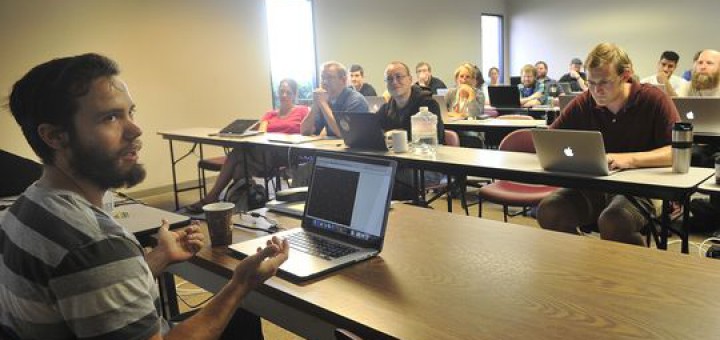Nashville Software School is grooming students to fill a large number of programming jobs in the area.
Samuel M. Simpkins / The Tennessean
It was Brandon Lyons’ father who told him about the Nashville Software School. Lyons had been laid off from his job as a Tennessee Department of Child Services officer and needed work. Given his early interest in computers, his father encouraged him to apply to the new nonprofit’s six-month program.
Since graduating in 2014, Lyons has become a software developer at app builder Metova in Franklin. He is mentoring new programmers and has more than doubled his salary since he left the child services department. Attending the software school was the best decision he has ever made, he said.
“At the time, I was a college dropout, I was just basically going and working jobs,” Lyons said. “Now I work in an industry where I’m constantly being challenged. … It’s changing my life.”
Since launching in 2012, the Nashville Software School has had a profound impact on the Nashville economy through the workers it has trained and the companies that hire them. As the only nonprofit coding school in the U.S., it serves as a model for addressing tech workforce challenges faced throughout the country.
In Middle Tennessee, software developers are among the most coveted tech hires, ranking just below systems analysts and user support specialists. The most recent Nashville Technology Council jobs report estimates there was an average of nearly 280 local software positions open each month in 2014.
The demand for tech talent has spurred action nationally and locally. In 2013, the Nashville Area Chamber of Commerce allocated $390,000 to a tech jobs board called WorkIT to help recruit skilled tech workers to Nashville companies. The White House announced a new $100 million TechHire initiative in March that includes Nashville, and more recently, the Nashville Technology Council has begun building a website that will connect students to jobs and training programs in the tech industry. It’s part of an $850,000 state grant that will also fund a tech internship program and coding programs during the summer and after school.
While the WorkIT site has led to greater awareness for Nashville’s tech community, no hires have been traced to it. Conversely, the software school has made its mark on the local workforce, graduating 165 students so far and addressing talent holes in the city. At the same time, it has instilled a pay-it-forward mentality in many of its students — calling on them to mentor other students and to get involved with local coding events — that will continue to fuel the city’s tech sector for years to come.
Building the school
Lyons was part of the untapped talent pool that John Wark describes when explaining why he created the Nashville Software School in 2012 — the unemployed, the underemployed or those on career paths that no longer held promise for them. They needed an affordable, timely way to reset their profession.
“You get all the college kids coming out into the crap economy, not finding good jobs, but you’ve got all the disruptions in the economy causing longstanding careers to be not as good, so you had people looking at career changes or people just tapped out on a career,” Wark said.
Meanwhile there was a growing chorus of company founders or executives bemoaning the difficulties of finding enough software programmers. The problem was that few companies were advertising for junior software developers; they wanted more experience. But to become a senior developer, one must first be a junior developer. If Nashville was going to address its talent pipeline, companies would have to be part of the training solution.
“We knew that to fuel the growth of any kind of tech economy we had to have more talent,” Wark said. “If we were successful, we could help (companies) find the talent to help them grow.”
For-profit software bootcamps were popping up in San Francisco, Chicago and Washington, D.C., and Wark, a developer and entrepreneur, began talking to other Nashville startup and tech leaders about launching one locally as a nonprofit. Mark Montgomery challenged a group of tech peers to write $5,000 checks to the school, to which Julia Polk, Townes Duncan, John Kepley, Adam Solesby, Joe Glaser responded favorably. The Nashville Area Chamber of Commerce also contributed $5,000, for a total of $35,000, and the working capital came from Wark.
The Nashville Software School opened its doors in August 2012 with 16 students at the Nashville Business Incubation Center. In the first year, two classes graduated from the program and now the school runs four classes of more than 20 students each year. By year end, it will have graduated 225 students — converting former songwriters, musicians, English teachers, journalists, chemists, baristas, Army captains, MBAs, architects and account managers into junior developers in an intense, six-month period.
Employer side
More than 65 Nashville-area companies, many of them startups, have hired Nashville Software School graduates and more than 20 companies are employee partners, which means they pay a placement fee that goes toward the majority of a student’s $10,500 tuition.
Getting employer buy-in was a crucial component to getting the school going. Wark and other board members met with local executives of mid-sized companies and asked, “What’s it going to take for you to hire junior developers?” They gathered a list of material that students should know before working at local companies, which guided the curriculum.
“We designed a six-month program to suit the needs of the Nashville market, which is all we are focused on,” Wark said.
CentreSource, a Nashville software company, was the school’s first partner, having felt the pain of competing for expensive talent. In addition to paying recruiters to find experienced programmers, the more experienced staff members had been training interns, which took valuable time away from projects.
“That’s revenue that we’ve gotten back, not having to spend that time,” said Brandon Valentine, development manager at CentreSource who is also on the software school’s board. “We are happy to pay the software school to do that for us.”
Instead of allocating recruiting dollars to staffing firms, CentreSource covers a large part of tuition costs for students who join the company. So far, five graduates have been hired.
“The benefit is that I get a known quantity,” Valentine said.
Building the next generation
Max Beizer, one of CentreSource’s first hires through the software school, now works remotely for San Francisco-based Heroku, owned by Salesforce. Three years ago he was waiting tables at the Bound’ry and other local restaurants while trying to make it in the city’s music industry — a “walking Nashville stereotype,” as he says.
No longer in the junior developer ranks, Beizer is mentoring students at the software school. Similarly, Rachel Werner, a developer at iostudio and a 2014 graduate, is a co-founder of Nashville Girl Geek Dinner, which brings women coders together twice a month. Several other female graduates have shared their insights with the group, and others have volunteered with high school coding programs and Nashville coding events, each contributing to the next wave of software developers.
The school, now operating in a bigger facility in South Nashville, has begun offering night classes for working students.
Demand has yet to ebb. Wark says the school can only accept half or a third of qualified candidates. Even with a for-profit coding school, The Iron Yard, soon to be operating in Nashville, Wark says the need is big enough for both.
“I don’t think we are close to pushing it over the edge yet,” he said. “I think we have a long way to go, certainly here in Nashville.”
Reach Jamie McGee at 615-259-8071 and on Twitter @JamieMcGee_.
Source: Tennessean
Nashville Software School: One solution to tech shortage














Recent Comments